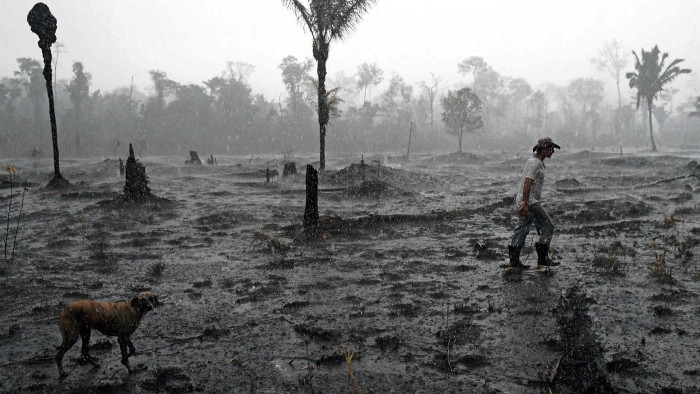BlackRock steps up drive to protect natural environment

Roula Khalaf, Editor of the FT, selects her favourite stories in this weekly newsletter.
BlackRock intends to push companies to step up their efforts to protect the environment from deforestation, biodiversity loss and pollution of the oceans and freshwater resources.
In guidelines published on Thursday, the world’s largest asset manager said it was ready to vote against the re-election of directors if companies had not effectively managed or disclosed risks related to the depletion of “natural capital”, the world’s stock of natural resources. It may also vote in favour of shareholder proposals that highlight natural capital risks.
Sandy Boss, global head of investment stewardship at BlackRock, said the use of natural resources and climate change risks was deeply interconnected. “The world will not reach the goals of the Paris Agreement, let alone the aspiration to reach net zero emissions by 2050, without curtailing deforestation and accelerating protection and restoration efforts,” said Boss.
More than half of the annual output generated across the global economy is either moderately or highly dependent on nature, according to the World Economic Forum. However, illegal deforestation and burning have expanded across much of the Amazon, Africa and south-east Asia.
In October, BlackRock backed a shareholder resolution at Procter & Gamble which called on the consumer goods producer to report on its efforts to reduce forest degradation due to the expansion of palm oil production.
“We expect companies to implement processes to identify, manage and mitigate adverse impacts on the environment, and to provide robust disclosures,” said Boss.
Larry Fink, BlackRock’s chief, has become one of the industry’s most prominent supporters of sustainable investing. In letters sent each year to fellow chief executives, Fink has urged business leaders to adopt more rigorous environmental, social and governance standards to improve shareholder returns.
Critics however argue that BlackRock has not used its immense influence effectively, particularly when exercising its voting power on sensitive ESG issues.
Moira Birss, climate and finance director at the charity Amazon Watch, said BlackRock’s words were “toothless” in the absence of meaningful consequences for those companies that were not addressing environmental issues. “BlackRock should adopt a definitive no-deforestation and human rights policy with clear accountability mechanisms that result in concrete improvements for communities, ecosystems and the planet,” said Birss.
BlackRock also plans to toughen its assessment of executive pay, a topic that is expected to prove contentious at shareholder meetings this year due to job losses and widening inequalities created by the coronavirus pandemic.
Climate Capital

Where climate change meets business, markets and politics. Explore the FT’s coverage here
BlackRock said on Thursday it would ask boards to explain how remuneration packages granted to executives are related to the interests of stakeholders including employees, suppliers and the communities in which companies operate.
Concerns about executive pay at Ocado, the UK online grocery supplier, prompted BlackRock to vote last year against the re-election of three directors and the remuneration report.
The pandemic has also led to complaints that workers in industries such as food processing and transportation have been exposed to higher infection risks which employers have either ignored or dismissed.
Boss said BlackRock expected companies to take steps to mitigate risks to staff that could arise from their business practices.
BlackRock voted in January against the re-election of the board of directors at Top Glove, the Malaysia-based rubber glove manufacturer. A quarter of the company’s workforce became infected with coronavirus after some employees were forced to live and work in unsuitable premises.

Click here to visit the ETF Hub
Comments